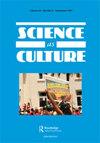Border control technologies: introduction
IF 2.4
3区 哲学
Q1 CULTURAL STUDIES
引用次数: 0
Abstract
ABSTRACT This introduction together with the whole special issue on border technologies challenges the limitations of potentially simplistic understandings of contestation, disputes, and political intervention inherent in many accounts of material politics. How do border technologies turn borders into a contested space and how do they come to matter for specific affected communities, especially migrants? How do border technologies manifest hegemonic border-control regimes and thereby marginalise their contestations? Or else, how do they open up alternative versions of the border? Simplified notions of material publics assume that controversial issues may easily turn public. They are also too narrowly framed within the logics of the nation state, de jure citizenship, and specific political articulations of contestation as legitimate within representative democracies. Therefore, these notions disregard opaque, non-transparent forms of government as they are in place through border control regimes, on the one hand, and other less visible forms of contestation deriving from migrant issues and struggles as non-citizens, on the other hand. Migrants concerned with these issues are already marginalised population groups in the context of border technologies. They potentially struggle to make public issues of concern among a wider audience. The introduction together with the special issue expands the analytical repertoire, first, to understand forms of (im)possibilities of contestations related to border technologies and how they are co-shaped by socio-material and epistemic conditions; and second, to include less visible types of material politics, as contesting articulations may appear differently and remain only partially known to wider publics.边境管制技术:介绍
摘要:这篇引言以及关于边境技术的整个特刊,挑战了许多物质政治报道中对争论、争端和政治干预的潜在简单化理解的局限性。边境技术是如何将边境变成一个有争议的空间的?它们对特定的受影响社区,尤其是移民,有何影响?边境技术如何体现霸权主义的边境控制制度,从而使其竞争边缘化?或者,他们如何打开边界的替代版本?物质公众的简化概念认为,有争议的问题很容易公开。它们也过于狭隘地被界定在民族国家、法律上的公民身份的逻辑中,以及在代议制民主国家中作为合法竞争的具体政治表述中。因此,这些概念一方面无视通过边境管制制度建立的不透明、不透明的政府形式,另一方面也无视移民问题和非公民身份斗争产生的其他不太明显的争论形式。在边境技术的背景下,关注这些问题的移民已经是边缘化的人口群体。他们可能很难在更广泛的受众中公开关注的问题。引言和特刊一起扩展了分析范围,首先,了解与边境技术有关的争论的可能性的形式,以及它们是如何被社会物质和认识条件共同塑造的;第二,包括不太显眼的物质政治类型,因为有争议的言论可能会以不同的方式出现,并且只为更广泛的公众所知。
本文章由计算机程序翻译,如有差异,请以英文原文为准。
求助全文
约1分钟内获得全文
求助全文
来源期刊

Science As Culture
Multiple-
CiteScore
5.20
自引率
3.80%
发文量
28
期刊介绍:
Our culture is a scientific one, defining what is natural and what is rational. Its values can be seen in what are sought out as facts and made as artefacts, what are designed as processes and products, and what are forged as weapons and filmed as wonders. In our daily experience, power is exercised through expertise, e.g. in science, technology and medicine. Science as Culture explores how all these shape the values which contend for influence over the wider society. Science mediates our cultural experience. It increasingly defines what it is to be a person, through genetics, medicine and information technology. Its values get embodied and naturalized in concepts, techniques, research priorities, gadgets and advertising. Many films, artworks and novels express popular concerns about these developments. In a society where icons of progress are drawn from science, technology and medicine, they are either celebrated or demonised. Often their progress is feared as ’unnatural’, while their critics are labelled ’irrational’. Public concerns are rebuffed by ostensibly value-neutral experts and positivist polemics. Yet the culture of science is open to study like any other culture. Cultural studies analyses the role of expertise throughout society. Many journals address the history, philosophy and social studies of science, its popularisation, and the public understanding of society.
 求助内容:
求助内容: 应助结果提醒方式:
应助结果提醒方式:


